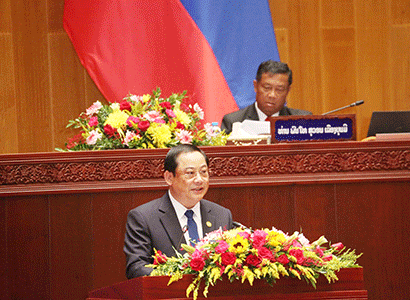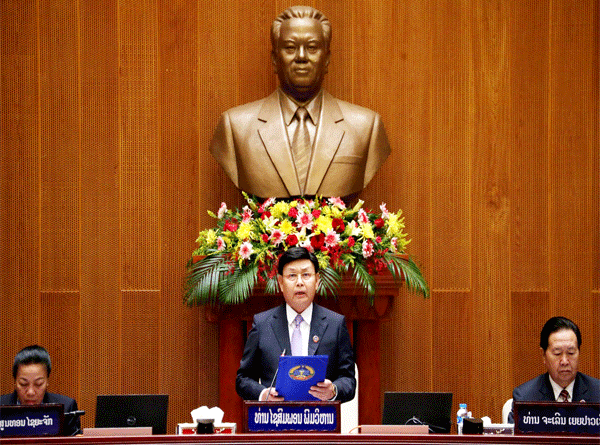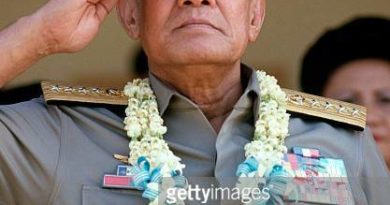ASEAN HEADLINE | An opening debate highlights moderate growth, measures to tackle economic woes
Dr Xaysomphone Phomvihane delivers opening remark.
.

The National Assembly (NA) kicked off its 7th Ordinary Session on Monday with debates focusing on moderate economic growth and measures to overcome the ongoing multiple challenges faced by the country.
The President of Laos’ top legislative body, Dr Xaysomphone Phomvihane, delivered the opening remarks declaring the biannual session open, then gave the floor to the government to deliver a report on its economic performance since the start of this year.
.
Prime Minister Sonexay Siphandone told Assembly members that the economic growth trajectory was positive despite the multiple challenges caused by the complex global situation and internal factors such as financial and economic hardship.
Gross Domestic Product (GDP) is projected to expand by 4.7 percent in the first half of 2024, amounting to 148,043 billion kip.
Increased activity in tourism and related services, transportation, and wholesale and retail sales are the key drivers of growth. Expanded agricultural production, together with the construction and processing industries, have also made positive contributions to the economy.
Revenue collection has also improved, bolstering the government’s spending capability. Some 25,957 billion kip was collected as of June 7, an increase of 64 percent compared to the same period last year.

Prime Minister Sonexay Siphandone addeesses the NA
.
With regard to the depreciation of the kip, the loss of value is still increasing but at a slower rate compared to 2023. The kip weakened against the US dollar by 3.98 percent, when comparing the figures at the end of May to those at the end of 2023, and weakened by 2.96 percent against the Thai baht.
.
“Although the value of the kip is still weakening, it is happening at a slower pace compared to 2023,” Prime Minister Sonexay told lawmakers.
President Thongloun Sisoulith attended the opening session.
Measures have also been introduced to service debts, which have prevented Laos from sliding into default, the PM added.
Steps have also been taken to lower the inflation rate, but this remains high, averaging 25.1 percent over the first five months of this year. The rate is expected to average 25 percent over the last six months of the year, which is far higher than the rate of 9 percent targeted by the government for the end of 2024.
Commenting on the government’s economic performance, the NA’s Standing Committee praised the progress made and underscored the areas that need improvement.
Although GDP growth is forecast at 4.7 percent, inflation remains high, NA Vice President Mr Sommad Pholsena told the session on behalf of the Standing Committee.
“Income per capita, when converted into foreign currency and calculated against inflation, has declined,” he said.
Although the amount of revenue collected exceeded the set plan, when compared to the currency exchange rate and revenue base, the amount was small at just 8.8 percent of GDP.
“The allocation of budgets for state investment projects and the servicing of debts is progressing slowly,” Mr Sommad said.
Incentivisation policies to support agricultural production have not been strongly rolled out and local farm production has been unable to offset imports, he added.
Mr Sommad stressed the need to streamline procedures to enable farmers to access finance so they could boost production, saying that although deposits in the banking system stood at 63 percent of GDP, the number of loans issued was small.
In addition, a shortage of foreign currency reserves has resulted in insufficient imports of fuel at certain times, which has affected production.
With only 30.6 percent of state investment capital having been mobilised, Mr Sommad said, this has resulted in the slow implementation of some state investment projects.
The NA Standing Committee also raised concerns over the decline in enrolment at secondary schools and polytechnics. Meanwhile, the school dropout rate has risen and numerous teachers, including volunteer teachers, have resigned, triggering concern over the worsening quality of education.
The out migration of labour has exacerbated the labour shortage in Laos, which underlines the need for the government to seek solutions.
By Souksakhone Vaenkeo
(Latest Update June 11, 2024)


 Memento Maxima Digital Marketing
Memento Maxima Digital Marketing







